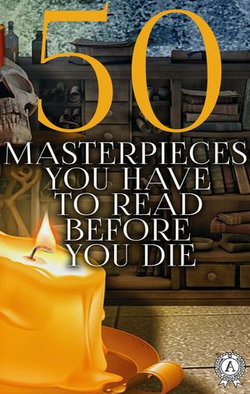50 Masterpieces you have to read before you die is the book that everyone should read to understand themselves and each other. The authors and works for this book were selected, as a result of numerous studies, analysis of the texts over the past 100 years and the demand for readers. It must be read in order to understand the world around us, its history, to recognize the heroes, to understand the winged expressions and jokes that come from these literary works. Reading these books will mean the discovery of a world of self-development and self-expression for each person. These books have been around for decades, and sometimes centuries, for the time they recreate, the values they teach, the point of view, or simply the beauty of words.
This volume includes famous works:
Frances Hodgson Burnett - The Secret Garden
Homer - The Iliad
Homer - The Odyssey
Charles Dickens - A Christmas Carol
Charles Dickens - Great Expectations
Charles Dickens - Bleak House
Charles Dickens - Oliver Twist
Lyman Frank Baum - The Wonderful Wizard Of Oz
Nathaniel Hawthorne - The Scarlet Letter
Nathaniel Hawthorne - The House Of The Seven Gables
Thomas Hardy - Jude The Obscure
Robert Louis Stevenson -The Strange Case Of Dr. Jekyll And Mr. Hyde
Robert Louis Stevenson - Treasure Island
Henry Haggard - King Solomon's Mines
Wilkie Collins - The Woman In White
H. G. Wells - The Island Of Doctor Moreau
Sir Walter Scott - Ivanhoe
Wilkie Collins - The Moonstone A Romance
Lucy Maud Montgomery - Anne Of Green Gables
Louisa May Alcott - Little Women
Henry Fielding - Amelia
Mary Shelley - Frankenstein, Or The Modern Prometheus
Arthur Conan Doyle - The Lost World
Leo Tolstoy - Anna Karenina
Euripides - Medea
Fyodor Dostoevsky - The Idiot
Fyodor Dostoevsky - Crime And Punishment
Alexander Pushkin - Eugene Onegin A Romance Of Russian Life In Verse
James Fenimore Cooper - The Last Of The Mohicans
Daniel Defoe - Robinson Crusoe
Joseph Conrad - Heart Of Darkness
Jonathan Swift - Gulliver's Travels
William Shakespeare - Romeo And Juliet
William Shakespeare - Hamlet, Prince Of Denmark
William Shakespeare - Othello
Oscar Wilde - The Picture Of Dorian Gray
John Bunyan - The Pilgrim's Progress From This World To That Which Is To Come
Charles Darwin - The Origin Of Species Or The Preservation Of Favoured Races In The Struggle For Life
Alfred Tennyson - Idylls Of The King
Bram Stoker - Dracula
James Joyce - Ulysses
Dante Alighieri - The Divine Comedy
Howard Pyle - Robin Hood
Jane Austen - Emma
Emily Bronte - Wuthering Heights
Thomas Hardy - Tess Of The D'urbervilles A Pure Woman Faithfully Presented
Giovanni Boccaccio - The Decameron
Rudyard Kipling - The Jungle Book




Share This eBook: